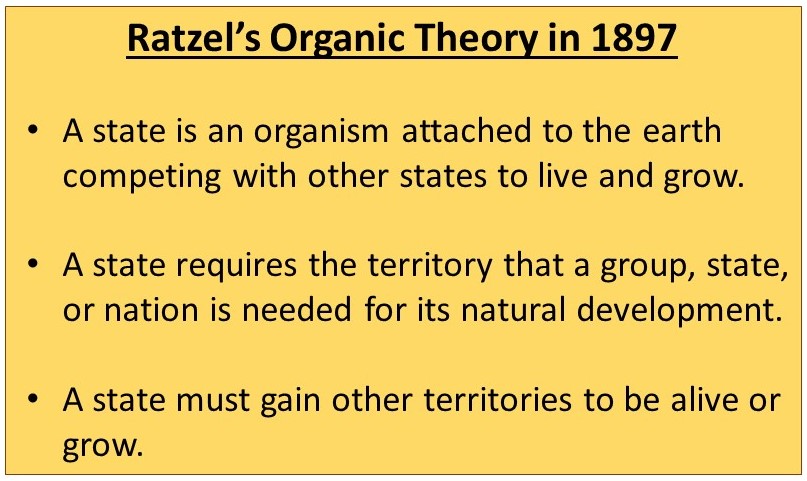The Organic Theory describes a political entity as an organism that requires nutrition to survive. This theory was applied by Adolf Hitler, to justify his ruthless expansion of Nazi Germany. The Organic Theory was developed by German geographer and ethnographer Friedrich Ratzel (1897). Mackinder’s Heartland Theory in 1919, is highly influenced by this organic entity of a state. Mackinder defines the pivot area as the heart of an organism.

The concept of the Organic Theory was that to survive and gain the political power of a political entity requires nourishment. Thus, political entities continuously seek nourishment gaining territories to survive in the same way as living organisms seek nourishment by food to survive.
The more territory a country conquers the can sustain and preserve itself. Otherwise, a country or a society should face the risk of security and always be vulnerable to attacks because other political entities also behave in this organic way tries to conquer more territories for self-preservation.
It is like competition among living organisms for a limited resource. This theory is also known as the organic theory of state and the organic theory of society. Particular social groups are also political entities that behave like a country or a nation.
Importance of Organic Theory
There are several examples of organic theory in the world. Here are some examples of application of the organic theory.
- Numerous political scientists, geographers, and ethnographers embraced the theory, which sought to utilize historical events to forecast future outcomes. The main objective was to shape policy decisions to ensure the stability of specific political entities and anticipate the behavior of other countries, especially those known for their aggressiveness, under specific conditions.
- When used as a political strategy, organic theory was frequently employed as a rationale for relentless and forceful expansion. Its underlying principle was the need for self-preservation. The justification put forth was that if a political entity failed to actively pursue new territories and grow, its existing territory would be vulnerable to attacks from other entities seeking similar nourishment.
- Throughout history, all major empires and political entities have prioritized expansion, with no political entity ever focusing on voluntary contraction. The closest historical event to voluntary contraction was the division of the Roman Empire into its Western and Eastern halves, with the latter evolving into the Byzantine Empire.
- The enduring characteristic of a nation acting in line with the organic theory remains evident. When a state cannot conquer a territory, it resorts to the next best course of action: involving itself in external matters for its benefit. An instance of this is the involvement of Western nations in the Middle East.
- Many ethnic groups facing marginalization, or those seeking self-governance as stateless nations, strive to break away from the governing entity they are currently under. However, if the larger entity allows self-determination to proceed, it will result in territorial loss and consequently, a decrease in resources. For instance, India is unwilling to relinquish control of the state of Kashmir to Pakistan because it would mean an expansion of Pakistan’s territory and validation of its actions, while India would suffer a loss of resources in this scenario.
Strength and Weakness
The strength of this theory is the explanation of how and why certain countries behave the way that they do. Many political geographers and political scientists took this theory to explain an event that happened in the past and going to happen in the future.
The weaknesses of this theory are that political entities are assumed to be organisms, but political entities are totalitarian states controlling the lives and happiness of the people. In a democratic social system, each individual has the perfect freedom of action, and the interest of the people at large is surpassed. This theory has no explanation for the function of the state and ruthlessness.
